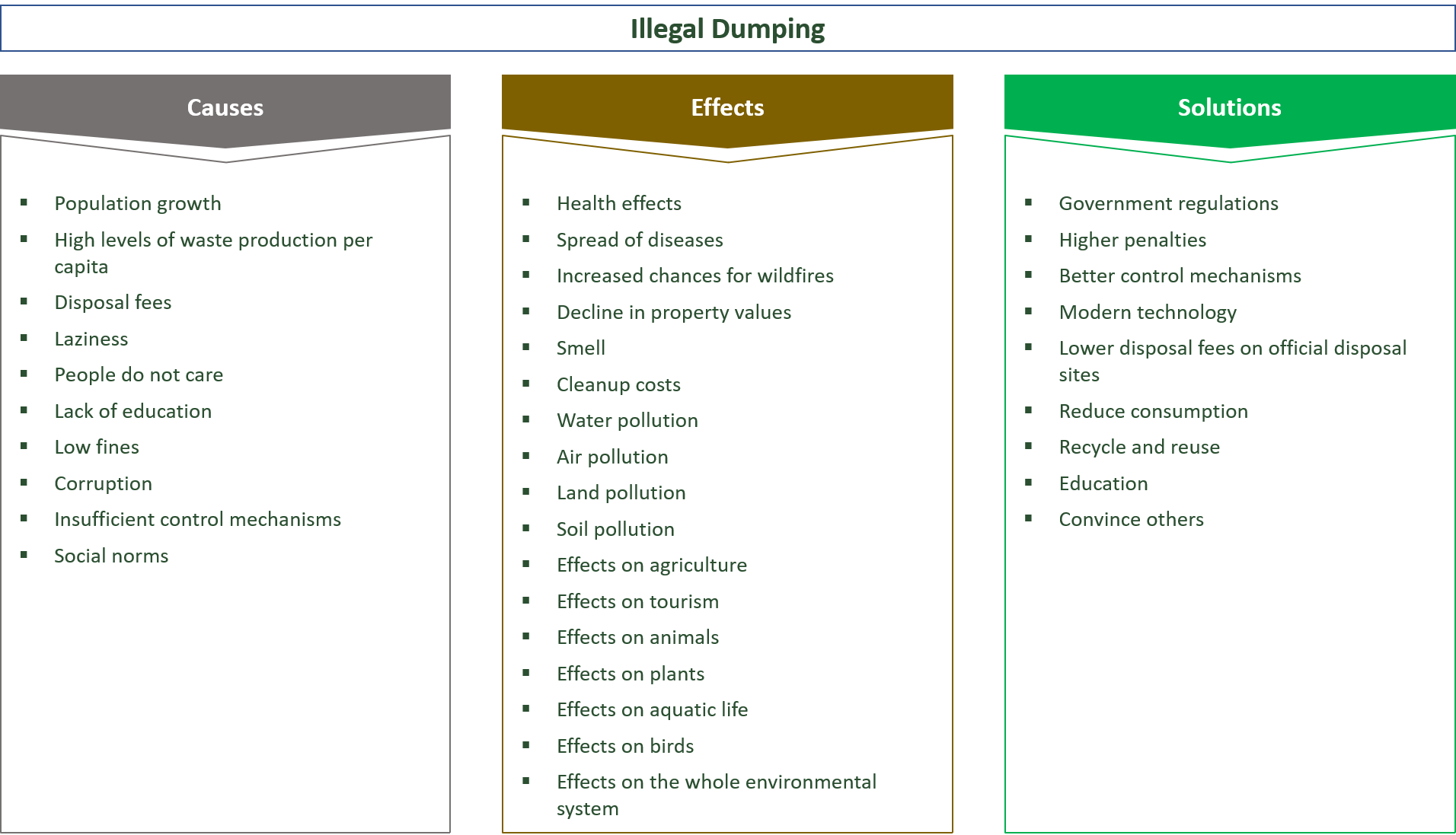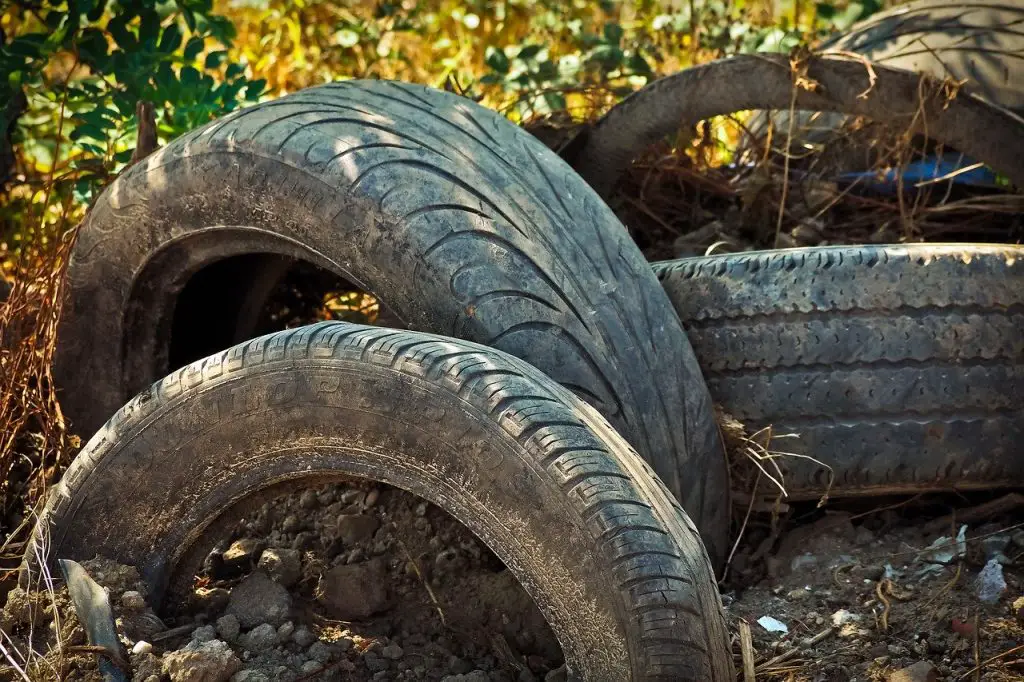“I think the economic logic behind dumping a load of toxic waste in the lowest wage country is impeccable and we should face up to it.”
Lawrence Summers
Illegal Dumping: Causes, Effects & Solutions

Illegal dumping (often also referred to as fly tipping or fly dumping) can be defined as the dumping of waste in an illegal manner instead of using officially authorized measures like curbside collections or rubbish dump.
Illegal dumping can lead to serious environmental issues and can also cause several health problems.
The causes, effects and solutions for the illegal dumping problem are presented in the following.
Audio Lesson
Contents
Causes of Illegal Dumping
- Population growth
- High levels of waste production per capita
- Disposal fees
- Laziness
- People do not care
- Lack of education
- Low fines
- Bribing
- Insufficient control mechanisms
- Social norms
Population growth
One cause for illegal garbage dumping is the growth in worldwide population.
Since the overall level of waste production is positively correlated with the number of people on earth, an increase in population also implies an increase in the amount of overall waste.
In order to get rid of the large amounts of waste, many people may use official waste disposal sites.
However, there may be a small but still significant amount of people who just dump their trash illegally in the woods or in other places.
This problem is likely to increase with an increase in population since more waste is produced and thus the probability for more illegal dumping is also likely to increase.
High level of waste production per capita
Moreover, also the level of waste production per capita increases in a significant manner.
Many people in third world countries now aspire to similar lifestyles as we have in our Western world.
This includes buying the newest stuff and also driving big cars.
However, striving for this kind of lifestyle will increase the overall world waste production level in a dramatic way.
Hence, also the probability of illegal dumping is likely to increase with the overall increase in waste production.
Disposal fees
High disposal fees are another cause of illegal dumping.
The higher the disposal fees, the higher is the incentive for people to illegally dump their trash instead of disposing it on official disposal sites.
This is especially true in poor developing countries where people or small businesses often do not have enough money or do not want to spend their money on appropriate trash disposal.
Therefore, also high disposal fees can contribute to the illegal dumping issue.
Laziness
Another reason for illegal dumping may be that people are simply too lazy to bring their trash to official dumping sites.
Instead, they may just dispose of their trash in the forests or other remote places where they are likely not get caught by official authorities.
Since people are likely to get more convenient over time, the problem of illegal dumping due to laziness is also likely to increase in the future.
People do not care
A fraction of our society may also not care about the illegal dumping problem and its consequences.
People may have many problems in their life.
If there are too many problems, people are likely not able to deal with all of them.
Therefore, they may prioritize their problems in a manner that they avoid mistakes that have the most adverse effects on themselves.
This may lead to a state where they ignore problems and negative externalities imposed on society.
Thus, the ignorance of people may also contribute to the illegal dumping problem.
Lack of education
Many people, especially in countries where the problem of illegal dumping is quite severe, may not even be aware of the negative effects of illegal dumping on our environment.
This may often be due to a lack of education. In some countries, even school kids have to work quite hard in their parent’s businesses in order to make enough money for their families.
However, working may prevent them from going to school, resulting in a lack of education in general but also regarding the topic of waste disposal.
Hence, a lack of education also contributes to illegal dumping.
Bribing
Bribing may also play a role in illegal dumping.
In some countries, it is possible to bribe state officials or other authorities in order to gain advantages.
This can mean that big corporations may bribe officials in order to be able to get rid of their waste through illegal dumping since it may be cheaper for them than disposing of their trash in an official manner.
This may be especially true for hazardous waste which would be quite expensive to treat and dispose of properly.
Thus, corruptive actions may also contribute to fly dumping.
Insufficient control mechanisms
In many countries, there is a lack of control mechanisms regarding illegal dumping.
In many cases, there is simply not enough staff for controlling peoples‘ trash disposal behavior.
For example, it is easy for people to dump their garbage in forests or other locations since there are not enough officials controlling these places.
Moreover, there may also be not enough financial resources to control illegal dumping more frequently.
Social norms
In many countries, illegal dumping is not regarded as a big deal.
Rather than a crime, it is often regarded as a minor issue by many people.
Humans are known to be influenced quite a lot by the people they mostly interact with.
This means that when your close friends regard illegal dumping as not a big deal or if they even actively contribute to it, you are also more likely to see it as an appropriate way to get rid of your trash.
Thus, social norms and the behavior of people that are closest to you play an important role for how likely you are to accept or reject the idea of illegal dumping.

Effects of Illegal Dumping
- Health effects
- Spread of diseases
- Increased chances for wildfires
- Decline in property values
- Smell
- Cleanup costs
- Water pollution
- Air pollution
- Land pollution
- Soil pollution
- Effects on agriculture
- Effects on tourism
- Effects on animals
- Effects on plants
- Effects on aquatic life
- Effects on birds
- Effects on the whole environmental system
Health effects
Illegal dumping can cause serious public health effects.
Illegally dumped waste may contain harmful or even toxic substances.
It may also include needles that may be contaminated with diseases like HIV or Hepatitis.
Especially for small children who often pick up stuff when they play, this poses a threat to their health since they may become infected with these life-threatening diseases.
Therefore, illegal dumping can be a serious threat to human health.
Spread of diseases
Moreover, illegal dumping can also contribute to an increased probability of the spread of diseases.
Especially organic waste can lead harmful bacteria to grow exponentially, providing optimal breeding conditions for these bacteria.
Therefore, if there is significant illegal dumping in certain areas, the chances for a spread in diseases increases dramatically.
Increased chances for wildfires
The probability of wildfires also increases due to illegal dumping.
Many items that are disposed of illegally are usually easily inflammable.
If there are thunderstorms that may start a fire or also wildfires started by human behavior, these materials may contribute to enhance the wildfires.
Moreover, the wildfire may also spread faster because of the inflammable trash.
Decline in property values
If the problem of illegal dumping is quite severe, property values are likely to decline in the affected areas. People usually do not value any kind of pollution.
They rather prefer clean areas for residential purposes.
Therefore, illegal dumping can also lead to a decline in property values if the concentration of illegal dumping in certain areas is too high.
Smell
Illegal dumping can also cause whole areas to be affected by unpleasant smell.
This is especially true if the trash contains high concentrations of organic compounds.
These compounds often release smell when are broken down by microorganisms.
Thus, illegal dumping can be a significant source of smell which may affect the life quality of nearby residents in an adverse manner.
Cleanup costs
There are also high cleanup costs related to the issue of illegal dumping.
It should be obvious that all the trash that is dumped illegally in forests or other locations has to be cleaned up sometime.
This cleanup process will likely be quite costly since a lot of manpower will be necessary to get rid of the pollution caused by illegal dumping.
Therefore, the dumping in an illegal manner also leads to high cleanup costs which are usually borne by the taxpayer.
Water pollution
Illegal dumping may also lead to water pollution.
In some cases, industrial garbage is simply disposed of in rivers or lakes.
This problem is especially severe in developing countries which often lack proper trash disposal processes and also controlling instances.
Through the dumping in rivers and other water bodies, the water is contaminated by harmful and sometimes even quite toxic substances.
Moreover, if trash is illegally dumped into forests, also our groundwater may be contaminated since rain will wash harmful substances through the soil.
Thus, illegal dumping is a significant source of several kinds of water pollution.
Air pollution
Illegal dumping may also contribute to air pollution.
Some sorts of trash may contain substances which release harmful compounds into the air when they decompose.
These compounds may include CO2 or other gases that have adverse effects on our environment.
Thus, air pollution can be caused by illegal dumping to a certain extent.
Land pollution
Illegal dumping also leads to land pollution.
Trash which is disposed of in locations where it does not belong will deteriorate the physical appearance of the affected areas.
Moreover, it will also affect the environmental system since part of this trash is likely to release harmful substances.
Soil pollution
There may also be adverse effects of illegal dumping on the soil.
Since some compounds of the waste may be harmful or toxic, these toxic compounds may be washed into the soil due to heavy rainfalls.
In the affected areas, the soil is likely to be contaminated which may in turn lead to contamination of the groundwater and may also affect the plants which grow on the soil.
Thus, illegal dumping is also likely to cause soil pollution.
Effects on agriculture
Illegal dumping may also affect agriculture in an adverse way.
If the soil gets contaminated due to illegal dumping, also the plants and crops may get contaminated.
Since there are quite strict ecological standards for food and also for crops, farmers may not be able to sell their crops for industrial purposes and therefore may suffer a quite severe financial loss due to illegal dumping.
Effects on tourism
People usually want to spend their vacation in places which are nice and clean.
When there is too much waste dumped in an illegal fashion in certain areas, people are more likely to switch to other vacation destinations.
For many countries, tourism is the most important source of income.
Therefore, especially for these countries, illegal dumping may be a quite serious threat to their livelihood.
However, many countries are aware of this problem and take measures to mitigate the illegal dumping issue in order to keep beaches and other natural areas as clean as possible.
Effects on animals
Illegal dumping imposes serious adverse effects on wildlife.
A fraction of the waste that is dumped in forests or other natural environments contains harmful substances.
Animals may be contaminated by these substances when they get in touch with them.
Moreover, animals may also get contaminated by harmful bacteria contained in the trash which may lead to a spread of diseases among different animals through the food chain.
Animals may also suffer from a change in their natural living conditions due to the dumping of trash.
Many animals react quite sensitive to a change in their natural living conditions and also avoid contact with humans and also with items made by humans.
Therefore, illegal dumping may also lead animals to move to other less contaminated areas where they feel more comfortable in their natural environment.
Effects on plants
Plants are also affected by exposure to trash since they extract elements out of the ground in order to grow.
However, if there is soil contamination, plants are likely to get also contaminated by harmful compounds.
Moreover, some garbage compounds may also alter the pH-level of the soil.
Since plants are usually quite sensitive to a change in acidity levels, illegal dumping may lead to adverse effects on the growth behavior of plants.
Effects on aquatic life
Aquatic life may also be significantly affected by illegal disposal of waste.
Many companies in countries with lax environmental standards often dispose of their industrial waste into rivers or lakes.
By doing so, water animals as well as many other water organisms will be contaminated.
Many of these water organisms will suffer from harmful substances and may even die from the adverse effects imposed by industrial waste compounds.
Effects on birds
Birds may also be affected by the dumping of trash. Birds often eat small animals like worms or insects.
If an area is extremely contaminated by illegal waste, the concentration of insects may decrease significantly.
This may in turn lead to a shortage of food for birds, which may in turn lead to a reduction in the birds‘ population.
Effects on the whole environmental system
Our environmental system is highly connected.
Small effects on this system may lead to big effects through chain reactions.
This implies that illegal dumping in certain areas may also cause adverse effects for areas far away through the food chain and other effects.
Therefore, illegal dumping displays a serious threat for the whole environmental system.

Solutions for the Illegal Dumping Problem
- Government regulations
- Higher penalties
- Better control mechanisms
- Modern technology
- Lower disposal fees on official disposal sites
- Reduce consumption
- Recycle and reuse
- Education
- Convince others
Government regulations
Governments have to set strict regulations in order to prevent illegal dumping.
Some industrialized countries have quite strict standards regarding waste disposal processes.
However, in many developing countries, these standards are rather low.
These standards have to be raised to get rid of the problem of illegal trash disposal.
Higher penalties
In many countries, the fines or penalties for the illegal disposal of waste are still quite low.
In order to mitigate the problem of illegally disposal of waste, it has to be ensured that the penalties for this kind of behavior are increased significantly.
By increasing fines for illegal dumping, people and industries have a bigger incentive to comply with the rules.
Thus, higher fines or other penalties would likely lead to a reduction in illegal waste disposal.
Better control mechanisms
Not only the penalties for illegal dumping should be increased, it has also be assured that there are enough controlling instances regarding the monitoring of waste disposal.
If people know that there are high fines for illegal waste disposal but they also know that there is nobody who is controlling them, people will likely continue to illegally dump their trash since they know they will not be caught.
Thus, better control mechanisms are key to mitigate the problem of illegal waste disposal.
Modern technology
Advancements in technology can also be used in waste disposal processes.
Through these advancements, it may become cheaper to process waste.
Through these cheaper processes, the disposal fees may also drop which would people give an incentive to avoid illegal dumping and to dispose of their waste in an appropriate manner instead.
Lower disposal fees on official disposal sites
Waste disposal sites may also be subsidized by governments or local authorities in order to be able to offer lower disposal fees.
By doing so, the incentive for people and industries to dispose of their trash in a legal way would increase and the adverse effects from fly tipping could be mitigated.
Reduce consumption
We can also contribute to mitigate illegal dumping and the related adverse effects if we change our consumption behavior.
Since the industrial revolution period, our consumption levels skyrocketed since we are able to use machines to produce large quantities of goods with a low unit price.
However, this development also led to a significant increase in waste.
In order to get rid of this waste, it is often shipped to poor countries in Africa where it is recycled or burned.
However, the part of the trash which has no economic value is often illegally disposed of.
Thus, our consumption behavior and the resulting production of trash also affect the level of illegal waste disposal.
We can therefore mitigate the problem to a certain extent by reducing our daily consumption levels.
Recycle and reuse
Another measure to avoid the production of trash and the implied illegal dumping processes is to recycle and reuse our things more efficiently.
This could mean that you give things that you no longer use away to other people instead of throwing them into the garbage.
If nobody is interested in your old stuff, you should at least make sure that it can be recycled in an effective manner by separating your waste appropriately.
Education
Education is key to mitigate problems.
This is also true for the illegal waste disposal issue.
We have to show people how illegal dumping affects our environmental system and what we can do to prevent it.
This education should start at a quite young age since children are usually more willing to change their behavior.
This could also translate into a changed behavior of their parents since their children will tell them about the adverse consequences and maybe change their minds.
Moreover, when these educated children turn into grownups, they are also more likely to behave in an environmentally-friendly manner.
Convince others
We can all contribute to mitigate the illegal waste disposal issue by changing our daily consumption behavior.
However, we can do much more! By convincing your family and friends to change their behavior, you can multiply your positive impact on the environment.
Conclusion
Illegal dumping is a serious environmental problem since it can affect the whole environmental system in an adverse way, including humans, animals, plants and all kinds of wildlife.
There are several measures governments and also private households can take in order to mitigate the problem.
By taking actions, we can solve or at least reduce the issue of illegal dumping and therefore ensure a livable future for the next generations.
Sources
https://en.wikipedia.org/wiki/Illegal_dumping
https://www.epa.sa.gov.au/environmental_info/waste_management/illegal_dumping

About the author
My name is Andreas and my mission is to educate people of all ages about our environmental problems and how everyone can make a contribution to mitigate these issues.
As I went to university and got my Master’s degree in Economics, I did plenty of research in the field of Development Economics.
After finishing university, I traveled around the world. From this time on, I wanted to make a contribution to ensure a livable future for the next generations in every part of our beautiful planet.
Wanna make a contribution to save our environment? Share it!
